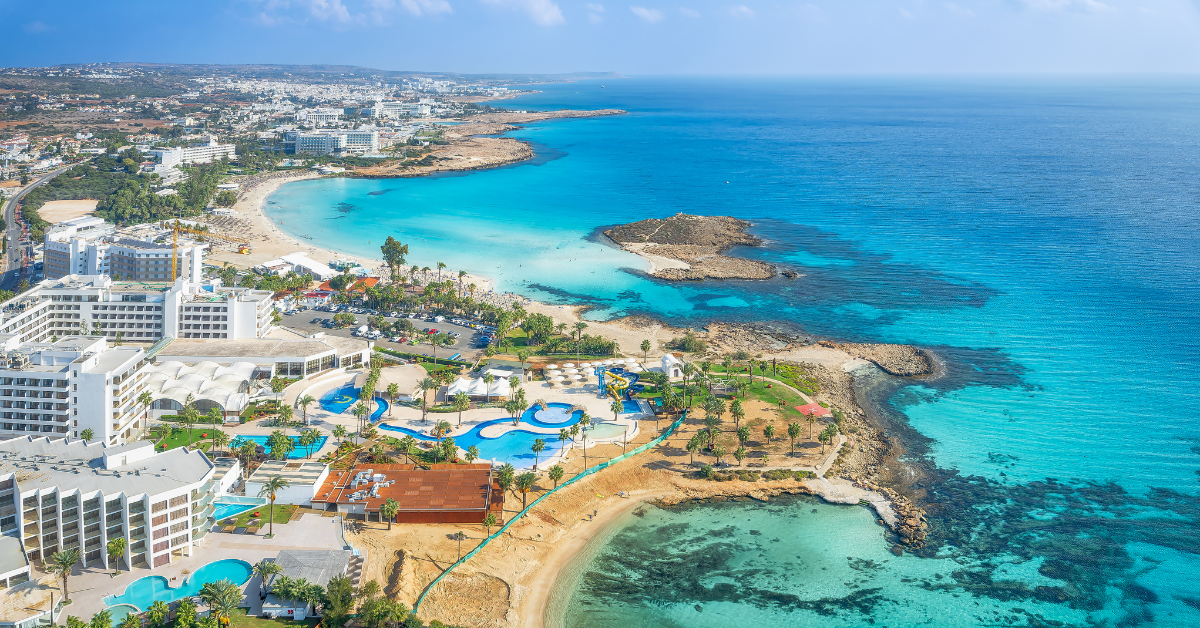Cyprus, officially known in Japanese as the Republic of Cyprus, also carries an older Chinese character transcription, “塞浦路斯.” This expression reflects a historical way of representing foreign place names through phonetic translation. For Japanese people, Cyprus evokes multiple impressions—a beautiful tourist destination, a land of deep historical encounters, a stage for international affairs, and even a familiar presence through sports.
The Chinese Character Representation “塞浦路斯”
The transcription “塞浦路斯” is an example of representing foreign words with Chinese characters. It was introduced to Japan through Chinese, with no semantic meaning attached, only phonetic value. The official Japanese designation is “Republic of Cyprus,” used in diplomacy and international contexts.
Historically, this representation appeared in newspapers and diplomatic documents, alongside expressions like “葡萄牙 (Portugal),” “西班牙 (Spain),” and “希臘 (Greece).” Though uncommon today, it holds academic value in understanding the history of naming foreign places.
| Country | Chinese Character Name | Modern Japanese Name |
|---|---|---|
| Cyprus | 塞浦路斯 | Republic of Cyprus |
| Spain | 西班牙 | Spain |
| Portugal | 葡萄牙 | Portugal |
| Greece | 希臘 | Greece |
The Tourist Image of Cyprus Among Japanese
Cyprus is strongly imagined by Japanese people as “an island of beautiful seas and ruins.” The beaches of Ayia Napa, with their clear waters, and the UNESCO World Heritage sites in Paphos are major attractions.
Japanese travelers often remark on the calm and less crowded atmosphere compared to the Aegean or Italy, and the slow, Mediterranean rhythm of life. This contrast makes it appealing as a quieter, fresher destination.
| Tourist Spot | Features | Japanese Impressions |
|---|---|---|
| Ayia Napa | White sandy beaches and nightlife | Popular with youth |
| Paphos | World Heritage ruins | Experiencing history |
| Nicosia | The divided capital | Feeling the political background |
| Troodos Mountains | Monasteries and nature | Calm cultural experience |
History and Culture Shaping Impressions
Cyprus has historically been a crossroads of civilizations, influenced by Greece, Rome, the Byzantine Empire, the Ottoman Empire, and Britain.
For Japanese, Cyprus often appears in textbooks as “a condensed intersection of world history.” The cityscapes mix European and Middle Eastern elements, while religious architecture and festivals are seen as attractive cultural experiences.
Its food culture resonates well with Japanese, as olive oil, wine, cheese, and seafood align with health-conscious ideals.
| Cuisine | Features | Japanese Impressions |
|---|---|---|
| Halloumi cheese | Grilled without melting | Growing popularity in Japan |
| Olive oil | Basis of Mediterranean diet | Matches health-conscious trends |
| Wine | Ancient tradition | A hidden gem |
| Seafood dishes | Fresh Mediterranean catch | Suits Japanese taste |
The Image of Cyprus Through International Affairs
An unavoidable aspect of Cyprus’s image is the division between north and south. Since conflicts in the 1970s, the island has been split, with two political entities: the internationally recognized “Republic of Cyprus” and the unrecognized “Turkish Republic of Northern Cyprus.”
This division often appears in international politics education in Japan, giving the impression of “a beautiful resort that also carries political tensions.”
| Perspective | Japanese Impressions |
|---|---|
| Politics | Land of ongoing division |
| International relations | Symbol of UN peacekeeping |
| Education | Appears in world history and IR studies |
| News | Known through conflict and negotiations |
Expanding Impressions Through Sports
In addition to tourism and culture, sports shape Japanese perceptions of Cyprus. Football (soccer) is especially popular, and Cypriot clubs often appear in European tournaments, where their spirited play against giants leaves an impression.
Japanese football fans vividly remember when APOEL Nicosia made waves in the Champions League. This reinforced the view of Cyprus as “a small nation that challenges on the world stage.”
The island’s warm climate also makes it a training ground for European clubs in winter, occasionally involving Japanese players. Moreover, Cyprus competes in the Olympics and other international events, strengthening the image of “a small yet familiar Mediterranean nation striving globally.”
Multifaceted Impressions Held by Japanese
The Japanese perception of Cyprus is layered, formed through tourism, history, politics, and sports.
| Domain | Japanese Impressions |
|---|---|
| Tourism | Mediterranean resort, beautiful beaches and ruins |
| History & Culture | Crossroads of civilizations, diverse traditions |
| International Affairs | Ongoing division, peacekeeping operations |
| Sports | Football as a symbol of international challenge |
Thus, Cyprus is seen as both a place of longing for leisure and a subject of international awareness, enriched with approachable aspects through sports.
Conclusion
The transcription “塞浦路斯” reflects the historical practice of phonetically representing foreign names with Chinese characters. Today, the official term in Japanese is “Republic of Cyprus.”
For Japanese, Cyprus embodies:
- Tourist allure with its seas and ruins
- Historical and cultural depth as a crossroads of civilizations
- International significance as a divided land tied to peacekeeping
- Sports-driven familiarity through football and global competitions
Altogether, Cyprus is not only a travel destination but also a place for learning history, reflecting on global politics, and connecting through sports.






